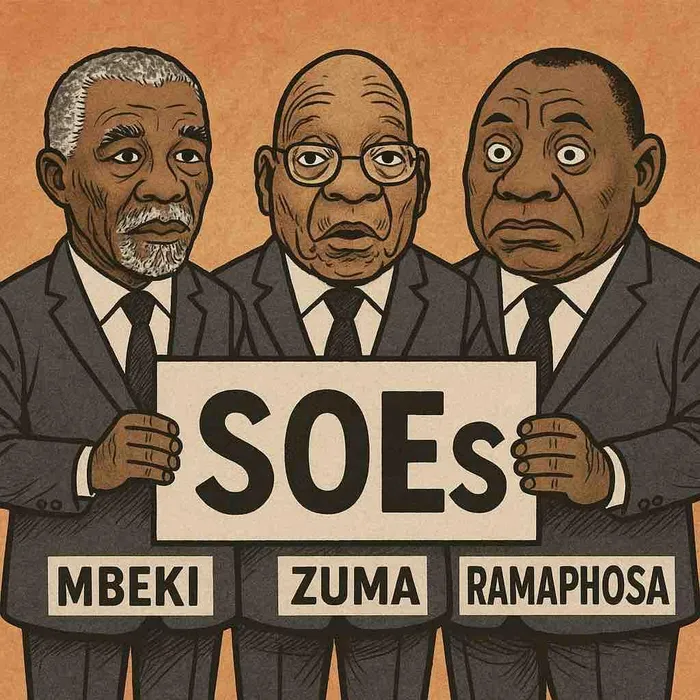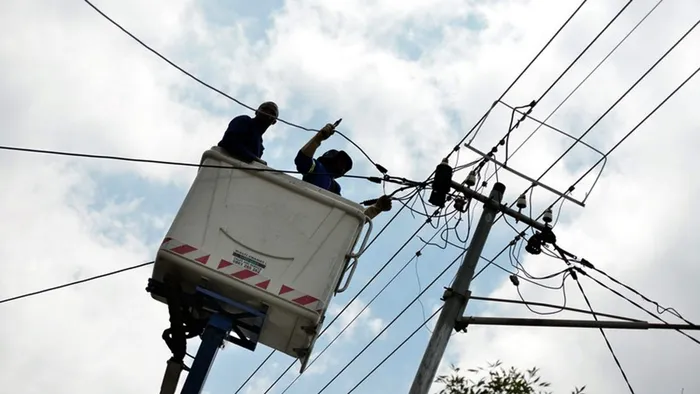Billions burned, little gained: The high cost of SOE bailouts under Mbeki, Zuma and Ramaphosa

The evolution of South Africa's State-Owned Enterprises: A tale of governance and economic challenges
Image: AI image
South Africa’s state-owned enterprises (SOEs) have long been viewed as critical instruments for national development and economic transformation.
Yet, over the last two decades, successive presidential administration - from Thabo Mbeki through Jacob Zuma to Cyril Ramaphosa — have demonstrated markedly different approaches to managing these entities.
Their inconsistent policies on bailouts and privatisation reflect larger governance challenges that have hindered the potential of SOEs and raised questions about South Africa’s economic future.
Under President Thabo Mbeki (1999–2008), SOEs were positioned as vital engines for developmental progress within a reformed and emerging market economy in the early 2000s.
Mbeki’s government adopted a pragmatic approach to economic reform, carefully balancing the developmental mandates of SOEs with market-friendly policies to attract foreign investment.
As early as January 2002, Mbeki's administration began pursuing selective privatisations despite strong opposition from trade unions.
According to a Mail & Guardian report from January 2002, the government had already sold shares in key enterprises such as Telkom and South African Airways (SAA), alongside smaller assets like radio stations and leisure resorts.
Although the SAA stake was temporarily repurchased following Swissair’s collapse, the government forecasted R12 billion in revenue from privatisation in that fiscal year alone, primarily from Telkom’s partial listing.
This measured privatisation agenda aimed not at wholesale asset sales but at “restructuring” to stave off looming financial crises, as the South African Institute of Race Relations later noted in its September 2016 report.
The report indicated that minority shares were sold to private and foreign investors in large SOEs such as Eskom, Transnet, Telkom, and Denel to improve operational efficiencies and raise capital.
However, according to the report, ideas such as selling a portion of Eskom’s power-generating capacity failed to materialise, reflecting a cautious stance towards scaling back state ownership.
President Jacob Zuma’s tenure (2009-2018) marked a steep departure from Mbeki’s cautious reform path.
Instead of structural transformation, Zuma’s government increasingly resorted to bailouts to keep SOEs afloat, amid widespread reports of mismanagement and corruption.
“Between 2008/09 and 2017/18, bailouts totalling approximately R105.7 billion were funneled into struggling SOEs, including Eskom, SAA, and Denel, often breaching fiscal spending limits,” read the report.
Former Democratic Alliance Shadow Minister Ghaleb Cachalia said in a statement issued in July 2013 that while the government disbursed hundreds of billions in bailouts, SOE executives collectively earned around R2 billion annually in remuneration.
“SAA received multiple government bailouts to restructure and manage debts; Denel was controversially involved in costly military contracts, which it was ill-equipped to handle; Eskom’s escalating capital needs ballooned out of control. Yet, these bailouts often masked systemic governance failures and failed to bring about meaningful reform.”
A July 2012 report by consultancy specialist, DNA Economics, reported that in 2009/10, the national government allocated R1.6 billion to SAA, and in 2007/08, R744 million was injected into SAA to allow the entity to restructure its operations and improve its debt-to-equity ratio.
Attempts to revive privatisation during this period faced fierce resistance from trade unions like Cosatu and the South African Communist Party, who warned that selling state assets risked massive job losses and higher consumer costs.
Taking office in 2018, President Cyril Ramaphosa made reforming SOEs a priority.
In October 2023, Bloomberg reported that Ramaphosa repeatedly pledged to shun privatisation, instead emphasising cleaning up balance sheets and reviving operational performance.
However, bailouts dramatically increased, reaching around R292 billion between 2018/19 and 2023/24, with Eskom still the largest recipient.

Between 2008/09 and 2017/18, bailouts totaling approximately R105.7 billion were funneled into struggling SOEs, including Eskom, SAA, and Denel
Image: Eskom
According to the National Treasury, by 2025/26, the power utility Eskom will have received a staggering R496 billion in bailouts since 2008/09.
The revelation surfaced in October last year during the Standing Committee on Appropriations, an update on the first-quarter performance of various state-owned enterprises, covering the period from April to June 2024.
In response to the crisis, the presidency reassigned shareholder responsibility for SOEs from the Department of Public Enterprises to relevant line ministries - a structural change meant to improve accountability.
However, these shifts have not fundamentally resolved the operational and governance challenges undermining SOEs.
Historian and political analyst Khaya Mthethwa criticised the ANC’s inability to maintain consistent, transformative policies across presidencies.
”Despite repeated electoral promises, such as nationalising key sectors, the ruling party has failed to enact foundational reforms like amending the constitution’s property clause (Section 25). Instead, Mthethwa contends, the ANC has " auctioned key state assets,” betraying its developmental mandate.
Irvin Jim, general secretary of the National Union of Metalworkers of South Africa (NUMSA), views privatisation as not just an economic choice but a political one.
“The privatisation of profitable operations, such as those at the Durban port and the auctioning of our national airline, shows that this push to cede control of key national assets to private capital is driven by ideology rather than necessity.”
He argued that South Africa needs a developmental approach that intervenes in the economy and champions stimulus packages in key strategic sectors.
“This kind of state would not tolerate rolling blackouts and the collapse of critical infrastructure,” said Jim.
thabo.makwakwa@inl.co.za
IOL Politics
Related Topics: